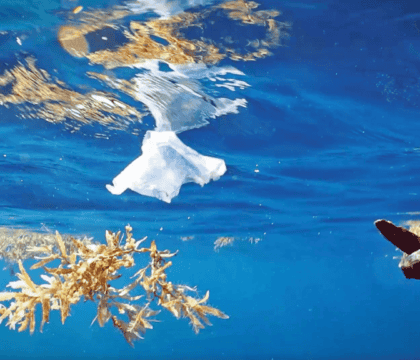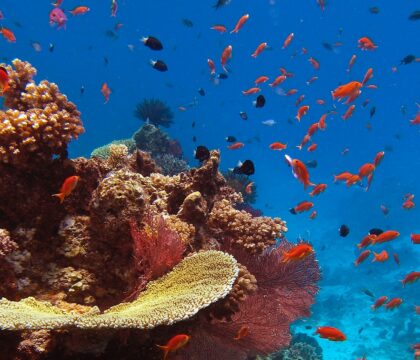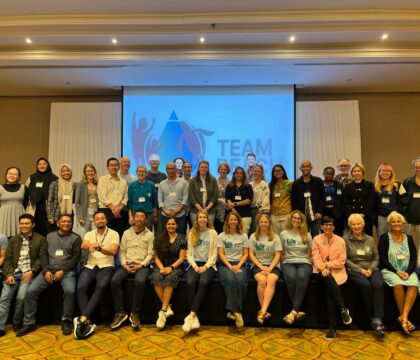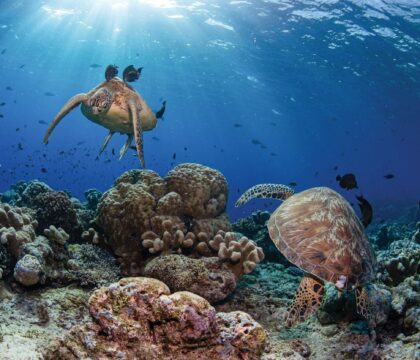June 30, 2023 • Program Updates, Trip Reports
Pelagic thresher sharks (Alopias pelagicus) are an elusive, globally endangered species known for long, whip-like tails that they use to stun their prey. Typically dwelling at depths of 500 meters (1600 ft) or below, they are rarely spotted in the shallows and are therefore one of the least studied species of sharks.
However, in Indonesia’s Alor Archipelago these magnificent sharks are commonly seen by tourists and residents in shallow waters while scuba diving, snorkeling, and boating. It’s not entirely known why pelagic thresher sharks visit the shallows in Alor, but researchers believe it is related to both the large number of pregnant female sharks in the area and the plethora of cleaning stations along the reefs. More research is needed for scientists to truly understand this unique phenomenon, and Oceanic Society is proud to have supported such research with a recent grant from our Expedition Impact Fund, a program that aims to support local, community-led, high-impact conservation efforts in the areas we visit worldwide (learn more).
The Need for Thresher Shark Conservation in Alor
The Alor Archipelago is a sparsely populated region of Indonesia that is home to exceptional marine biodiversity. Alor forms its own regency within the province of East Nusa Tenggara, comprising 17 districts, 158 villages, and a population of ~200,000. One quarter of the population is concentrated in the regency’s capital, Kalabahi, which is adjacent to the Pantar Strait, a core habitat of thresher sharks and other pelagic species.
The communities of Alor depend on fishing as their main livelihood and source of protein, and one of their biggest catches is the thresher shark. Despite being difficult to catch, local fishermen have become very adept at catching thresher sharks – so much so that the population has declined by 80 percent in the last 10 years.

Communities in Alor depend on fishing as their main source of protein and income. © Erik Lukas / Ocean Image Bank
With marine tourism (snorkeling and scuba diving) growing at a rapid pace in Alor, there is an opportunity to use that tourism growth as a catalyst for positive change. With this idea at the forefront, a collaboration was born between Oceanic Society’s long-term partner, Planet Deep, a new eco-resort, SAVU South Alor, and Thresher Shark Indonesia. Together, they strive to foster a fundamental shift in communities’ perception, recognizing thresher sharks as enduring assets that hold long-term value for both tourism and the environment, as opposed to viewing them merely as a finite resource to be harvested and exhausted.
Supporting Thresher Shark Research through Travel
In October 2022, Oceanic Society led our first trip to the Alor Archipelago in partnership with Planet Deep and SAVU South Alor. In tandem with the trip, we were thrilled to be able to provide Planet Deep with our first Expedition Impact Fund grant since the onset of the COVID pandemic. The grant went to support an acoustic monitoring program in collaboration with Thresher Shark Indonesia. The acoustic tagging program will help scientists and conservationists to understand the behavior and ecology of thresher sharks and the threats they face in ways that can support improved conservation efforts. For example, acoustic tagging can provide insights about the sharks’ habitat use, such as site fidelity behavior, timing and duration in areas visited, and more. These types of data are critical for enabling local management authorities to develop regional policies to protect the shark population, as well as for improving the national management strategy of all shark species in Indonesia (learn more here).

Rafid Shidqi of Thresher Shark Indonesia presents to Oceanic Society travelers in Alor. © Rosie Jeffrey
As a part of this grant, co-founder and CEO of Thresher Shark Indonesia, Rafid Shidqi joined our travelers to discuss the work and conservation value of their research, and to demonstrate some of the work involved in tagging sharks. Our guests were offered the opportunity to engage with shark research, visit the villages to learn about sustainable tourism and economic offsets, and meet the researchers and community leaders who have taken on this important initiative.

Oceanic Society travelers pose with local community members and their thresher shark weavings in Alor. Conservationists are working with local residents to establish tourist-oriented businesses that provide alternatives to fishing and enhance the value of living thresher sharks.
In the communities, Oceanic Society travelers were able to visit and support local businesses that have been created to provide alternative sources of income, offering products such as homemade granola, thresher shark weavings, and pottery. Travelers also visited a community chicken coop that was set up to provide an alternative source of livelihood and protein for the residents. We also learned firsthand from local business owners that the transition was not always easy at first, but that they are starting to see the benefit of these alternative, more reliable, and safer sources of income. Beyond promoting these local businesses, the shark researchers are also hoping to be able to hire former shark fishermen to assist with the acoustic tagging of the sharks in the future.
Through the combination of research, education, partnerships, and, ultimately, establishment of marine protected areas (MPAs), these organizations and communities are helping to ensure that these important marine predators continue to thrive in the wild.
About Oceanic Society’s Expedition Impact Fund
As a part of our conservation travel model, we work to: 1) support ocean conservation; 2) motivate “blue habits” and 3) strengthen sustainable economies. To further support those goals, in 2019 we created the Expedition Impact Fund to provide additional support to the ocean conservation partners that we interact with during our expeditions. The fund is seeded by contributions from Oceanic Society and our travelers and provides fast-tracked grants to our partners for their important ocean conservation work, with an emphasis on local, community-led, high-impact programs. It offers an added opportunity for our travelers to contribute to the conservation efforts they see and learn about on our trips, beyond the contributions made through the trips themselves. Learn more about our conservation travel model here.
Learn More
- Alor Snorkeling and Diving Trips with Oceanic Society – Learn more about our expeditions in Alor
- Maintaining Balance: Thresher Sharks and People in Alor – Learn more about the work of Thresher Shark Indonesia
- Planet Deep – Learn more about our regional partner Planet Deep
- SAVU South Alor – Learn more about our partner SAVU South




